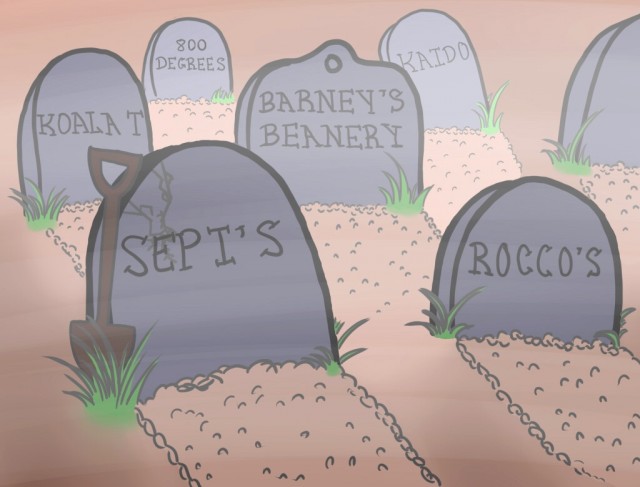Westwood’s casual drinkers can rest easy: Their new choices for a relaxed, inviting destination are a rowdy tavern and a bar that blasts music from the early 2000s.
Sepi’s, a casual pub and sub shop in Westwood, closed its doors Tuesday. To say there was an uproar would be an understatement. Sepi’s has been a Westwood favorite for 50 years and its closure seems to be only the most recent battle in the war between older Westwood residents and UCLA students.
The bar’s troubles started when its owners were told the building they occupied would undergo construction. And so they searched Westwood Village for another location, but to no avail.
But even if Sepi’s had gotten approval for an alcohol license at a new venue, it would have had to get a variance to operate as a “fast-food restaurant” – something that could be easily blocked by residents.
The reason: the Westwood Village Specific Plan, a 1989 zoning ordinance under the Los Angeles General Plan that was most recently amended in 2004.
Sepi’s will only be another tragedy in the common tale of businesses struggling to open in Westwood – like Tocaya Organica, Tender Greens and 800 Degrees – until the Village updates the specific plan’s definition of fast-food restaurants, gets rid of its quotas on the kinds of permitted businesses and eliminates arcane things like its parking requirements.
The specific plan classifies any restaurant that uses disposable utensils and packaging, charges guests before they eat or posts a sign with its prices as “fast food.”
“Basically anything less formal like Tender Greens or 800 Degrees is considered fast food,” said Michael Skiles, Westwood Forward leader and president of the North Westwood Neighborhood Council. “It seems ridiculous, but even Starbucks is considered fast food.”
The plan does not make distinctions between the various types of restaurants, ranging from proper fast food like Taco Bell to places like Sepi’s that clearly don’t involve fast-moving food.
To add fuel to the fire, the specific plan outlines quotas on the number of fast food restaurants allowed in the Village. It’s near impossible for a nonupscale restaurant to open in Westwood given the specific plan sets a maximum of 40 fast food restaurants, and nearly every type of restaurant, barring Napa Valley Grille, is considered fast food. That’s precisely why Sepi’s found it difficult to move elsewhere in the Village without going through an appeals process.
The quota is egregious, since students drive the economy in Westwood and cheap food and alcohol are arguably the primary sustenance of college students. While Sepi’s could potentially get a variance, the process is long and expensive, with no guarantee the business would eventually win.
Not only is the specific plan’s quota out of touch with the reality of economic demands in Westwood, but it unduly empowers other residents to oppose all kinds of restaurants, since they can easily appeal any nonsit-down restaurant trying to find a place in Westwood.
And their appeals actually have grounds, since, according to the specific plan, Westwood is oversaturated with fast food restaurants – oversaturated, that is, with casual mom and pop pubs that have been here for 50 years.
“Our specific plan – rather than (supporting) the business community – is actually discouraging tenanting,” said Andrew Thomas, the Westwood Village Improvement Association’s executive director. “And now Sepi’s cannot move in a district that has high vacancy.”
The final nail in Sepi’s coffin was the specific plan’s parking requirement. Thomas said since Sepi’s was trying to move to an area that is designated as retail, it would have to provide parking or sign a deal with a parking garage. Westwood is a college town and students mostly walk or ride-share around the Village, so the parking requirement is really just an arbitrary barrier to tenanting.
It’s clear the specific plan is archaic and only serving to worsen Westwood’s economic vitality. Sepi’s is not the first business to shut its doors because of the shortcomings of the plan, nor will it be the last if certain residents continue to have their way.
While neighborhood councils certainly have a vested interest and right to regulate business in their districts, the specific plan simply gives Westwood residents too much power to bar nearly all kinds of businesses that would be successful in the Village.
In fact, this community input and the requirements set out in the specific plan have only contributed to high vacancy rates and failing businesses that have permeated Westwood for years.
Thomas said Westwood’s vacancy rate is 16%, which is a clear indicator of the specific plan’s failures. Sepi’s inability to reopen nearby only worsens an already bleak situation for businesses in Westwood.
It’s time for a reality check of what businesses will actually thrive in a college town like Westwood – and not so shockingly, fast, casual restaurants and establishments like Sepi’s are the ones that do.
For now, though, students will have to make do with AMF’s at Rocco’s and “fast food” like Tender Greens.

